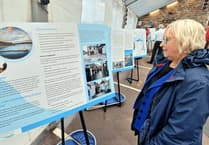LOCAL people have lent their voices to a national outcry against the mass closure of railway station ticket offices.
Earlier this month the Rail Delivery Group (RDG) announced plans to close almost all of England’s 1,007 staffed offices.
Liskeard Town Council is among the many to lodge its objection to the proposals, which it says will penalise those with sight or mobility issues, anyone who doesn’t go online, and the wide range of people who need and appreciate the help of ticket office staff in order to obtain the best value tickets from a complicated system.
The RDG says the change is needed to modernise the rail industry. The move will see ticket office staff redeployed to roving roles, where they’ll assist people on platforms. It says that the proportion of tickets purchased from a ticket office has declined from 82% in 1995 to just 12% today.
But in Liskeard this figure is higher, says the Town Council: 21.5% of tickets are purchased from the office, a greater number than are purchased from the vending machine outside the station (17%).
The RMT (Rail, Maritime and Transport) Union has described the closure plans as a ‘savage attack on railway workers and the travelling public’, and believes that widespread job losses will follow. The union said: “We all know that closing ticket offices will make the railway less safe, secure and accessible and this is part of the Government and rail companies’ plans to de-staff the railway.
“Together we need to mobilise to defeat, dilute and delay these plans.”
Local transport consultant Peter Murnaghan said that GWR had done better than most other rail operators in that it had actively sought the views of local councils and groups through holding online meetings, and by publishing statistics on the use of local ticket offices.
But Peter argues that whilst the consultation is bringing to light all manner of objections, it will be the government who take the decision, whether or not the Rail Delivery Group feels that it’s the right thing to do.
“Most train companies are franchises of the Department for Transport (DfT) and 14 of the companies (including GWR) are directly controlled by DfT. Their ticket revenue goes straight back to DfT. Companies like GWR are merely agents for DfT and therefore are effectively ‘Yes Men’ to the government’s demands.”
Transport for All is a national group which works to improve access to public transport and street space for all those with any kind of disability. The organisation says that it is staggered that disabled people and the groups that represent them were not asked to give their input at policy level.
“Given the size and scale of the proposed changes, with such profound impacts on disabled people, it is staggering that disabled people and our organisations have not had the opportunity to influence this policy at a national level, and that it is instead going out to public consultation,” said Transport for All.
The organisation is urging people to make their views known: “The evidence and objections that people share during the consultation will mean we can hold the Secretary of State to account for doing their duty under the Equality Act, demonstrate in words and numbers how catastrophic these proposals are, and more easily apply for a Judicial Review of any decision.”
How do I have my say?
The consultation period for people to give their feedback on the proposed closure of ticket offices has been extended to September 1.
To submit your views, visit: www.transportfocus.org.uk/ticket-office-consultation or email: [email protected] or post to: Freepost RTEH-XAGE-BYKZ, Transport Focus, PO Box 5594, Southend-on-Sea, SS1 9PZ




